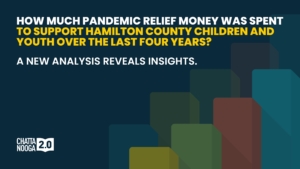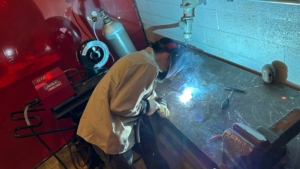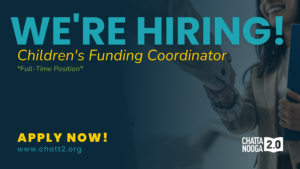If I could be the education god, and I could endow every educator with only one thing, it would be the heart-felt, gut-level, absolute belief that every student is gifted! I believe that all learning is self-directed, facilitated, and contextual. Learning is facilitated in the home, facilitated in the school, and facilitated in the community, which includes the workplace. The parents, teachers, and community members are the learning facilitators.
We know that an individual’s most powerful motivation is his or her own belief about what he or she can accomplish. This does not mean that every individual has equal potential in any given area. Rather, it means that, whatever an individual’s potential might be, he or she can develop that potential.
I lived in Chattanooga for several years in the 1960s, when our town was declared to be America’s dirtiest city. In 2001, I was delighted to return to a Chattanooga that had prepared for the future. The city has cleaned up its air, and it is in the process of cleaning up the rest of its infrastructure. Beginning with initiatives such as Chattanooga Venture and Vision 2000, our city has become a national example of how a community works together to achieve change. But, as often happens when an organization—be it a company, a city, or a nation—makes significant change, that change is followed by a lull while new initiatives are being considered.
Areas that remain to be addressed are the educational systems, in Hamilton County in general and in Chattanooga in particular. Note the reference to systems as opposed to system. For reasons that have not been sufficiently explored, our community has developed and maintained an extensive assortment of individual educational entities, including private schools, parochial schools, and a growing homeschool movement, leaving the public-school system to struggle for sufficient resources to be effective and relevant. Indeed, in Chattanooga and Hamilton County, a higher percentage of students attend private, parochial, and homeschools than do students in any other metropolitan area in the nation. This reality creates a unique set of challenges, not the least of which is the opportunity for public-school students to attend schools where the total population represents the natural mix of society in terms of culture, race, and social class.
When I returned to Chattanooga in 2001, I did so at the invitation of the University of Tennessee at Chattanooga to fill the newly endowed McKee Chair of Excellence. It is an honor to hold this position. Not only does this chair bear the responsibility for adhering to the vision and mission of the University of Tennessee at Chattanooga, the position is directly responsible for honoring the vision and mission of O.D. McKee himself, who developed an internationally prominent company, McKee Foods. Since 1928, the company has maintained the highest standards of quality and service in all aspects of its business, and O.D. McKee continues to be recognized as one of the premiere visionaries of the Chattanooga area.
It is my desire to represent these values both in the academics supported by the McKee Chair and to provide a dynamic platform of service that encourages engagement between the University of Tennessee at Chattanooga and the Chattanooga regional community. It is in this regard that I address my interest in the various objectives of Chattanooga 2.0. I have been involved conceptually and actively in this new Chattanooga venture, and I am particularly encouraged by the proposed three-year plan of the Inclusive Education & Opportunities Action Team. This plan suggests a cultural shift toward empathy and acceptance of students with disabilities—one in which they are no longer seen as those children, but as our children.
A bit of the historical context within which we are addressing this issue seems appropriate here. The national law that addresses the rights of students with disabilities, Public Law 94-142, was first passed in 1975. Although the original law has been revised several times, the basic elements have not changed. The challenges of complying with those elements have been and continue to be challenging. For example, in 1984, the U.S. Dept. of Education issued its Sixth Annual Report to Congress on P.L. 94-142; it contained the following statement:
Relatively slow progress in developing new knowledge about special-education practice, as distinct from knowledge about specific individual differences, instructional techniques, or local programs, has created a conceptual vacuum in the field, which tends to be filled by bureaucratic form rather than [with] educational substance.
Additional efforts continued during ensuing years to fulfill P.L. 94-142, but with relatively little progress in understanding and addressing some of the most basic elements of the law. Fast-forward about 25 years after the law was first enacted. The law was re-authorized by Congress under a new name, the Individuals with Disabilities Act, or IDEA, but the basic elements remained the same. In 2001, the President’s Commission on Excellence in Special Education delivered its report, which included the following:
Major recommendation 1: Focus on results—not on process. IDEA must return to its educational mission: serving the needs of every child. Although the law must retain the legal and procedural safeguards necessary to guarantee a “free appropriate public education” to children with disabilities, IDEA will only fulfill its intended purpose if it raises its expectations for students and becomes results-oriented—not driven by process, litigation, regulation, and confrontation. In short, the system must be judged by the opportunities it provides and the outcomes achieved by each child.
Major recommendation 1: Focus on results—not on process. IDEA must return to its educational mission: serving the needs of every child. Although the law must retain the legal and procedural safeguards necessary to guarantee a “free appropriate public education” to children with disabilities, IDEA will only fulfill its intended purpose if it raises its expectations for students and becomes results-oriented—not driven by process, litigation, regulation, and confrontation. In short, the system must be judged by the opportunities it provides and the outcomes achieved by each child.
For a quarter of a century, we had focused on special-education eligibility and placement by assigning students to a separate program—even to a separate location—as the solution. In reality, the solution was, as it always has been, to serve qualifying students in general education, which includes special education.
Almost two additional decades have now passed, and it is my carefully considered conclusion that we are still preoccupied with the process at the expense of the product. Both the process and product are important, of course. But it is a good outcome that we want, not just a good process. So, let’s revisit the law, this time as it was reauthorized, in 2004, as the Individuals with Disabilities Education Improvement Act (IDEIA). Here is the reference:
IDEIA – Regulations: Part 300 / A / 300.39, Sec. 300.39 Special education. (a) General. (1) Special education means specially designed instruction, at no cost to the parents, to meet the unique needs of a child with a disability.
The law has not changed in 41 years! The law does not require the provision of available interventions to meet the generalized needs of students. Rather, it clearly mandates that students should receive facilitated intervention in the form of instruction that is unique and specific to the individual.
Thanks to Chattanooga 2.0’s proposed three-year plan of the Inclusive Education & Opportunities Action Team, we have the unprecedented opportunity to demonstrate compliance with a law that has guaranteed educational rights to children with disabilities (and virtually every other child as well) for more than 40 years. I am proud to be a part of this action on behalf of all of the children in Hamilton County.
…
James Tucker
McKee Chair of Excellence
School of Education
University of Tennessee Chattanooga





